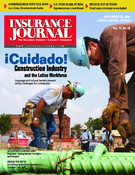Send Olive Oyl out to the grocery for a can of kale?
The nationwide recall of bags of fresh spinach due to the contamination of some brands by the E.coli virus might not have affected Popeye at all–since he ate his essential greens out of a can–but it’s obvious that the nation as a whole will suffer temporarily as the leafy vegetable disappears from grocery shelves for the time being. (Taking a chance, I ordered spinach, mushroom and artichoke quesadillas in a restaurant a few days ago. However, they arrived at the table sans spinach.)
Anyway, nowadays Olive probably would tell Popeye in no uncertain terms that he’s perfectly capable of securing (and cooking) the green veggie of his choice.
Nevertheless, the recall certainly raises a few questions about the safety of our nation’s food supply, as well as the insurance industry’s role in protecting it.
As of Sept. 18, 114 persons infected with the spinach-related strain of E.coli O157:H7 had been reported to the federal Centers for Disease Control from 21 states, according to the CDC. The states reporting cases are California (1 case), Connecticut (2), Idaho (4), Illinois (1), Indiana (8), Kentucky (6), Maine (2), Michigan (4), Minnesota (2), Nebraska (1), New Mexico (5), Nevada (1), New York (7), Ohio (10), Oregon (5), Pennsylvania (4), Utah (15), Virginia (1), Washington (2), Wisconsin (32), and Wyoming (1), the CDC said.
Although it’s been reported that the Federal Drug Administration has found no evidence that the E.coli contamination of the fresh spinach, which has been traced to farms in California, is deliberate, the crisis points to the vulnerability of agricultural products in the U.S. Contaminated irrigation water has been identified as a potential source of the bacteria, although at this writing investigators are still trying to determine how the spinach became infected with the E.coli strain.
The recall also serves to underline the message conveyed by Dr. Jerry R. Gillespie, director of the Western Institute for Food Safety and Security (WIFSS), at the 19th Annual Insurance Skills Center Agribusiness Conference, which took place in Sacramento, Calif., last spring. As reported by Insurance Journal — West Editor Patricia-Anne Tom, Gillespie says the U.S. agricultural system is at great risk for agroterrorism (see page 58). Our country’s agriculture infrastructure “is probably more shaky than the public really knows,” Gillespie said in a presentation at the event. He said even if someone with ill intent claimed to have infected the food supply without really having done it, the claim itself could “bring the [food] industry to its knees.”
Gillespie maintains that local political leaders, designated public agencies and first responders, such as fire and police departments, need to be trained not only in how to respond to agroterrorism, but also in what it looks like. He said the insurance industry, with its understanding of risk, should also be involved in prevention and recovery efforts.
After all, without his spinach, Popeye may not have the strength to beat up the bad guys.
Was this article valuable?
Here are more articles you may enjoy.


 Married Insurance Brokers Indicted for Allegedly Running $750K Fraud Scheme
Married Insurance Brokers Indicted for Allegedly Running $750K Fraud Scheme  What Analysts Are Saying About the 2026 P/C Insurance Market
What Analysts Are Saying About the 2026 P/C Insurance Market  Beazley Agrees to Zurich’s Sweetened £8 Billion Takeover Bid
Beazley Agrees to Zurich’s Sweetened £8 Billion Takeover Bid  MAPFRE Denied Injunction Against AAA Auto Insurance Sales in Massachusetts
MAPFRE Denied Injunction Against AAA Auto Insurance Sales in Massachusetts 


